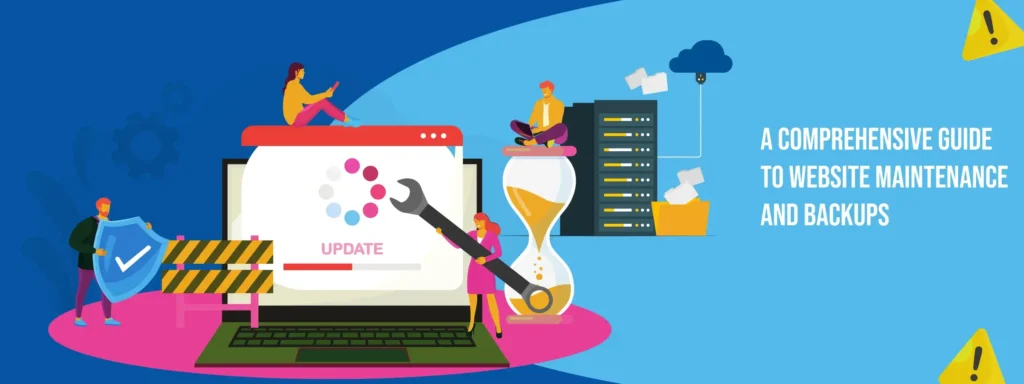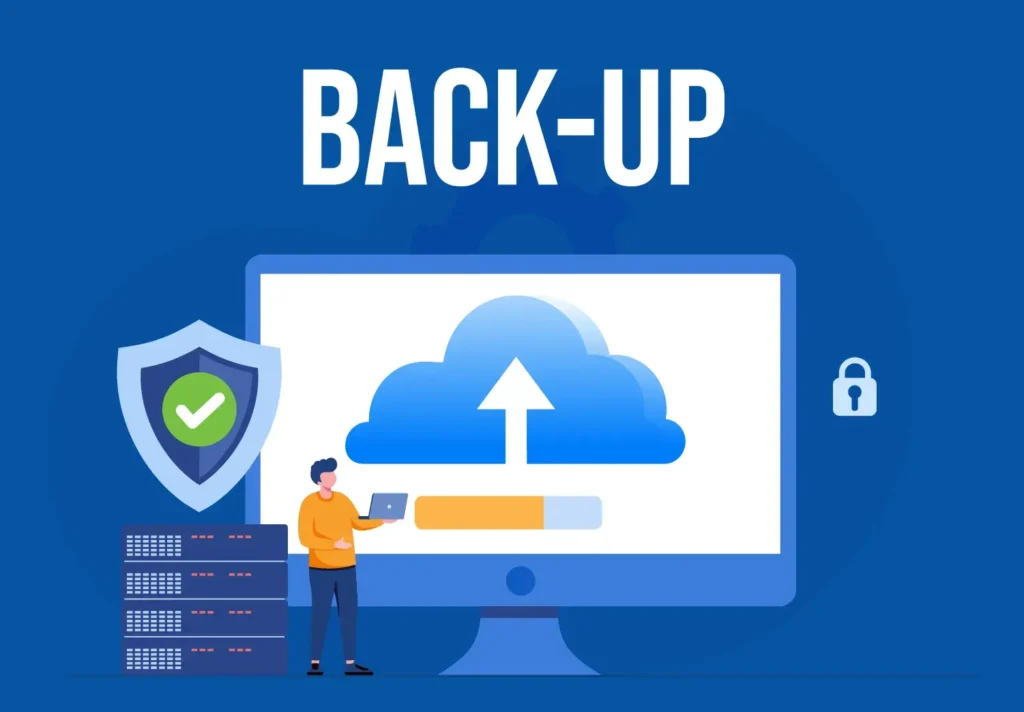
30 March A comprehensive guide to Website maintenance and backups
In today’s interconnected world, your website is the cornerstone of your online presence, acting as the primary interface through which you engage with customers and showcase your brand. Just as a physical storefront requires regular upkeep and security measures to protect its assets, your digital storefront demands diligent website maintenance and support and robust backup best practices to ensure its stability and safeguard against cyber threats. This comprehensive guide delves into the critical aspects of website maintenance and backups, offering invaluable insights and practical strategies to fortify your online domain, protect your data, and uphold the integrity of your digital identity in an increasingly volatile digital landscape.
The Importance of Website Maintenance Services
Website support and maintenance serve as the digital equivalent of regular health checks for your online platform. Just as neglecting the upkeep of a physical store can lead to deterioration and loss of business, failing to maintain your website can result in decreased performance, lower search engine rankings, and vulnerability to security breaches. For e-commerce sites, where transactions occur daily, the stakes are even higher. Regular maintenance ensures the smooth operation of these platforms, reinforces customer trust, and enhances the overall user experience.
WordPress Website Maintenance
Maintaining a WordPress website involves regular updates to the WordPress core, themes, and plugins to patch security vulnerabilities and add new features. Regular backups are crucial to recovering your site in case of a hack or accidental data loss. Security plugins such as Wordfence or Sucuri can help defend against malware attacks by providing firewall protection and regular security scans.
Critical Components of Website Maintenance
- Website Backup: Integral to the maintenance process is the creation of regular backups. The importance of website backup cannot be understated—it is your safety net in the event of data loss due to hardware failure, cyber-attacks, or accidental deletion. Implementing backup best practices, such as automated or cloud-based backups, ensures that you can swiftly restore your website to its pre-disruption state, minimizing downtime and loss of revenue.
Security Measures for - E-commerce Websites: With the prevalence of online transactions, e-commerce websites are prime targets for cybercriminals. Implementing SSL certificates, utilizing advanced firewalls, and installing reputable security plugins are foundational steps in creating a secure shopping environment. Regular security audits and adherence to PCI DSS (Payment Card Industry Data Security Standard) further safeguard sensitive customer data against unauthorized access and breaches.
- E-commerce Website Backup Solutions: Given the dynamic nature of e-commerce platforms, with constant updates to product listings and user transactions, choosing the right backup solution is crucial. Automated and cloud-based backup solutions are particularly suited for these websites, providing regular, hassle-free backups and ensuring data is securely stored off-site.
Understanding Cyber-attacks
Cyber-attacks are targeted actions by cybercriminals aiming to breach another entity’s information system. These attacks can take various forms, such as deploying malware, executing phishing scams, or launching denial-of-service attacks, with motives ranging from financial gain to causing disruption
The menace of Malware
Malware, or malicious software, is a tool often used in cyberattacks. It encompasses various harmful software types, including viruses, ransomware, and spyware, each designed to infiltrate, damage, or take control of a victim’s device without their knowledge.
Some strengthening security measures include,
- SSL Certificates: Implementing SSL certificates is a fundamental step in securing a website. They encrypt the data exchanged between a user’s browser and the website, ensuring sensitive information remains confidential.
- Firewalls and Security Plugins: Utilizing firewalls and security plugins adds a robust layer of defense. Firewalls control the flow of traffic to and from your website, while security plugins actively monitor for and protect against potential threats.
- Regular Security Scans: Performing regular security scans is crucial for the early detection and removal of malware. These scans help identify vulnerabilities and threats, allowing for prompt action to mitigate risks.
Why is website backup important?
The importance of website backup cannot be overstated. Backups are more than just a fallback plan; they’re an integral part of website maintenance that protects your investment and ensures your online presence remains uninterrupted. Whether it’s safeguarding against data loss after a cyber-attack or quickly recovering from a technical glitch, having a reliable backup process in place gives you peace of mind and keeps your website running smoothly. By identifying what needs to be backed up, determining the best frequency for your backups, and choosing a method that suits your needs, you can ensure that your website is well-protected against the unexpected. Remember, the goal is to make your website resilient and ready to bounce back, no matter what challenges come its way.

Exploring Backup Methods
When considering backup methods for your website, it’s essential to understand the available options and how they cater to different needs. Each method has its strengths and particular use cases.
- Automated Backups: Many web hosting services offer automated backup solutions that can be configured to run at specific intervals (daily, weekly, etc.). These are invaluable for ensuring consistent backups without manual intervention. WordPress websites, for instance, can benefit significantly from plugins like UpdraftPlus or VaultPress (Jetpack Backup) that automate the backup process, capturing all website data, including the database, themes, plugins, and uploads.
- Cloud-based Backups: Storing backups in the cloud (e.g., Google Cloud, AWS S3, Dropbox) offers flexibility and reliability. Cloud storage providers generally offer robust security measures, ensuring your data is protected against physical damage and cyber threats. Cloud solutions are scalable, allowing for increased storage as your website grows, which is particularly beneficial for e-commerce platforms with large volumes of data.
- Manual Backups: This method involves manually exporting your website’s database and copying your website files, providing complete control over what is backed up and when. While time-consuming, manual backups can be a good practice for website owners who wish to have an immediate backup before making significant changes to their site.
Conclusion
In conclusion, the essence of a strong online presence lies in meticulous website maintenance and robust backup strategies. As this guide illustrates, these practices are fundamental to ensuring your website’s functionality, security, and reliability. By adopting a proactive approach to website care, businesses can protect themselves against cyber threats while maintaining customer trust and operational continuity.
The journey toward a secure, efficient, and resilient website does not have to be navigated alone. At Webdoux, we specialize in providing top-tier website support and maintenance services tailored to your business needs. By partnering with us, you gain access to expert solutions that keep your website at its best. Ready to fortify and optimize your website? Reach out to Webdoux today, and let’s chart the course to digital excellence together.
